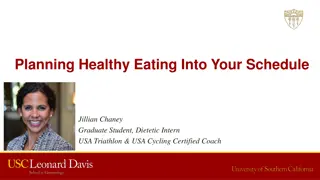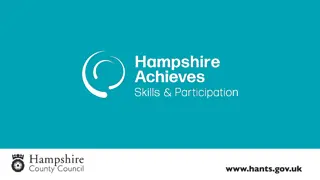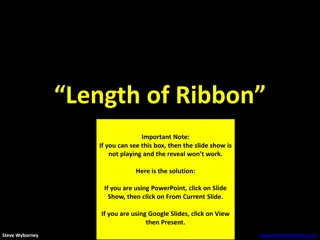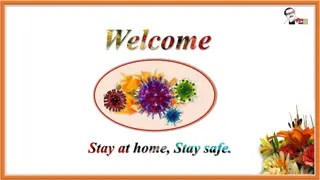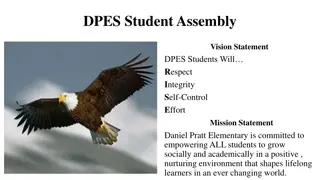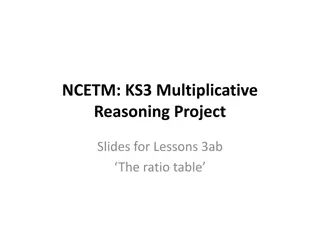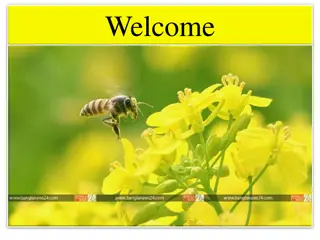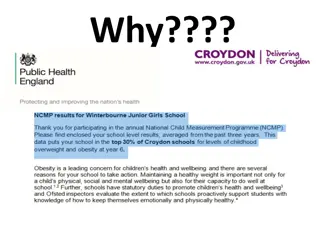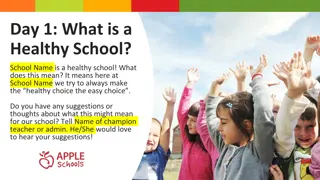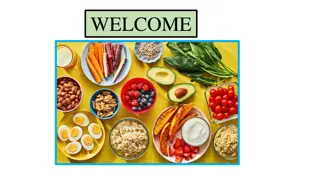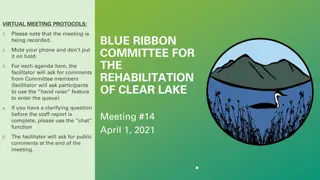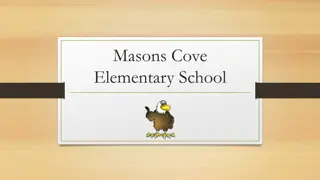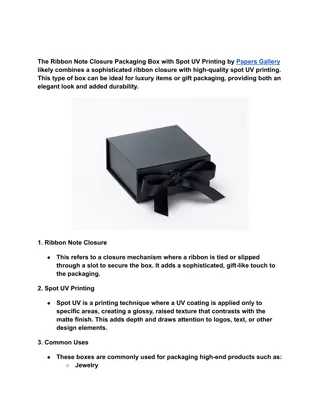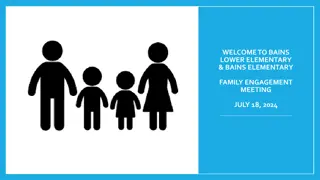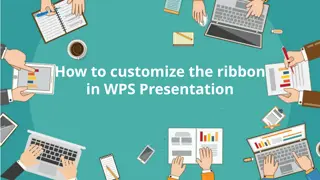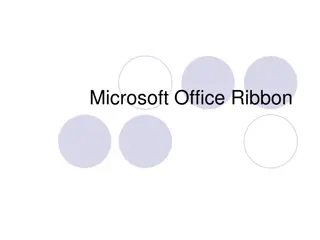Red Ribbon Week: Exploring Healthy Choices for Elementary Students
Red Ribbon Week is a special week where schools globally focus on learning about healthy choices and avoiding unhealthy decisions. Students are encouraged to make positive choices, understand consequences, and follow the Golden Rule to create a better world. The initiative emphasizes the importance of decision-making skills, peer pressure avoidance, and civic duty awareness. Through activities and discussions, students engage in learning how to make healthy choices to ensure a bright future.
Download Presentation

Please find below an Image/Link to download the presentation.
The content on the website is provided AS IS for your information and personal use only. It may not be sold, licensed, or shared on other websites without obtaining consent from the author. Download presentation by click this link. If you encounter any issues during the download, it is possible that the publisher has removed the file from their server.
E N D
Presentation Transcript
Red Ribbon Week: Exploring healthy choices for Elementary Students
What is Red Ribbon Week? Red Ribbon Week is a special week where schools all over the world learn about making healthy choices and about the dangers of unhealthy choices. It is very important that we all learn how to avoid things, people, or decisions that can hurt us or hurt others so that we can have bright futures! Today, we will focus on learning about how to make healthy choices, how to avoid and say NO to unhealthy choices, how to avoid peer pressure, and what civic duty is and how it helps our world to be a better place!
How Do We Make Healthy Choices? Before making a decision, we must always stop to consider everything that might happen if we do or don t make that choice. Let s try a few together Your brother left out his Ipad that you want to play with. Play with his Ipad I could get in trouble, it could break, he might not let me use it again Don t play with his Ipad I wouldn t get to play the game, but I could ask him instead when he might be willing to let me use it
Lets try a few more on our own Healthy Choice Quiz Consequences Situations & If you eat the cookies and get caught your family might not trust you You might miss out on eating the cookies later If your mom was making them for a specific reason you might cause problems for her. Your mom left cookies on the counter to cool, and they re your favorite! You re supposed to read a long book to discuss in class the next day, but you could just ask your older sibling to tell you about the book since they read it last year. You might not learn everything that you would have if you read it and might get caught You might be embarrassed if you can t answer the questions You might flunk a test or assignment Your friend is going to sneak some cool gel pens from the book fair. She did it last year and didn t get caught! You could get caught and get in big trouble You might face consequences (missing out on quarterly parties) People may not trust you, you will feel guilty.
The Golden Rule: We act how we want others to act Why Do We Make Healthy Choices? To make the world a better place So others can trust us To become successful Your choices determine your character and who YOU are I will be proud of myself (so will those around me) To experience positive consequences or so that good things happen to us To avoid negative consequences
What are some examples of healthy choices? Follow rules & laws Reading Healthy Choices Healthy choices help us to grow into smart, kind, and healthy adults with bright futures! Getting enough sleep Boundaries Playing an instrument Wearing a seat belt Saying NO when you need to Learning coping mechanisms Asking for help when needed (counseling) Taking medication as prescribed by a doctor Learning something new Make good friends Wearing a helmet Wearing Sunscreen & Bug repellent Washing your hands Good hygiene Spending time with those who bring you joy Forgive Get regular check ups at the doctor Staying home when you re sick Reading Safety Labels Exercising & remaining active Be true to yourself Eating Healthy
Not Resting Illegal Drugs Alcohol Not Unhealthy Choices Unhealthy choices hurt our minds, personalities, our bodies, and our futures. Unhealthy choices also hurt those around us. washing your hands Restricted apps Or websites Talking to strangers Limiting fruits or vegetables Taking another person s medication Risky Behavior Smoking or vaping Too much screen time Grudges Keeping your feelings bottled up inside Breaking laws or rules Using products in ways they weren t intended Playing with weapons Not covering coughs or sneezes Eating too much or not enough Mean or bullying behavior Too much sugar Not playing outdoors Skipping breakfast Picking your nose
What are some of the dangers of unhealthy choices? The Dangers of Unhealthy Choices That all depends on what the unhealthy choice is and exactly how you make that unhealthy choice. Let s explore some of the potential dangers/consequences of three unhealthy choices. Increased chance of injury or death, poor decision making, altered thinking/behavior, poor body control, sickness, alcohol poisoning, a ticket for drinking underage, jail time, high blood pressure, heart disease, liver disease, digestion problems, cancer, and even death. Drinking alcohol Short-term effects can range from changes in appetite, wakefulness, heart rate, blood pressure, and/or mood to heart attack, stroke, psychosis, overdose, and even death. These health effects may occur after just one use. Longer-term effects can include heart or lung disease, cancer, mental illness, HIV/AIDS, hepatitis, and others. Long-term drug use can also lead to addiction. Drug addiction is a brain disorder. Not everyone who uses drugs will become addicted, but for some, drug use can change how certain brain circuits work. These brain changes interfere with how people experience normal pleasures in life, their ability to control their stress level, their decision-making, their ability to learn and remember, etc. These changes make it much more difficult for someone to stop taking the drug even when it s having negative effects on their life and they want to quit. Other consequences may include conflict in family and other personal relationships, getting thrown out of school/ college or work, getting a criminal record, getting into debt to pay for drugs, violence associated with drug dealing etc. Impaired brain structure and function, obesity, insomnia, mood swings, and even problems at school. Because children's brains undergo so much change during their formative years, this excess screen time can be even more damaging Illegal drugs Too much screen time
Peer Pressure Peer pressure is when friends or other people try to get you to do something. They may try to encourage you, bribe you, trick you, or even manipulate you in order to get you to do what they want you to do. There are several reasons why they may want you to do what they are trying to get you to do, such as to look cool , so they don t get in trouble or get in trouble alone, because they think it will be fun, or because they don t want to do it themselves. Peer pressure may look like the following scenarios: Nick tells you to trip the kids behind you in line because it would be funny Jarod found some pills in his brothers room that he says make you feel good and he wants you to take some Julia said that math class is lame and asks if you want to hide in the bathroom and skip class It s important to know that anyone who is peer pressuring you does not have your best interest in mind and is not a true friend.
Just Say NO There are many easy ways to tell someone that you don t want to do something. No No thanks I can t Nah That s not for me I d rather not Nope I don t want to That s not right No, I ll get in trouble That s not cool I have to go home now Remember, no one can tell YOU what is or isn t cool . The definition/meaning of cool varies from person to person. For example, one person might think that basketball is cool, while another might think that football is cool. One person might think that listening to R&B music is cool, while another thinks that alternative music is the best. We are all unique and diverse individuals so we all have different tastes and preferences, so it would be weird for any one person to be able to decide what is cool for everyone. However, healthy choices tend to be pretty similar for everyone. Every single person that smokes is damaging their body, there are no exceptions to that. Even though what exercises we prefer may be different and we may do them at different levels/intensities, every single person that exercises is healthier for doing so. Still no exceptions!
Who is affected by our healthy or unhealthy choices? Who is affected by our choices? EVERYONE! If you choose to make unhealthy choices, it almost always affects others. If one person in your family decides to stop showering, they will eventually start to smell pretty bad! This could cause discomfort or disgust, for other things to become more dirty (clothes, furniture, etc.), and could even cause sickness due to the germs they may carry from poor hygiene! If your classmate refuses to help with a group assignment that you re required to finish (whether they help or not), you will have to do twice the work to get the grade you want! If someone throws garbage outside and an animal eats it or gets trapped inside it and dies, it caused the animal great harm and also makes our Earth unhealthy and ugly. If someone does drugs or drinks alcohol and drives a car they could hurt themselves or others! This causes pain or even death, which devastates families, friends, and communities! If a doctor is killed, their patients will suffer. If a teacher dies, her students will suffer. It also costs the family money when someone is at the hospital getting treatment or if they die and have a funeral.
How much do unhealthy choices cost? Making unhealthy choices also costs our country (us) a LOT of money! As citizens of a state/country, we are required to give some of our money to our government (taxes). When there are big problems in our country, our government has uses the tax money we gave them to try to solve those problems. Due to people making unhealthy choices, many people have died. A tremendous amount of tax dollars are spent on crime control, on drug user rehabilitation and treatment (helping people stop using drugs), on treatment of children born with addictions, on programs for teenage mothers, educating people about unhealthy choices to prevent them from making those choices, and cleaning up the environment. Money spent on one thing cannot be used for something else. When people choose to make unhealthy choices, WE pay for it! The USA spends over 50 BILLION dollars to combat the problems that drugs cause every year.
You have a responsibility to yourself, your family, your friends, and your community. Those responsibilities may look different depending on your age, your culture, your values and beliefs, your situation, and more! The older you get, the more responsibilities you tend to have. Responsibility for self, others, and the world You are not always in control of what happens to you, but you are responsible for how you react. Healthy and smart choices usually lead to good things, while poor choices usually lead to challenges and consequences. We hope that after learning about smart, healthy choices that those are the ones that you will make, but everyone makes mistakes along the way. Learn from these mistakes so you don t make them again and so that you can become smarter and stronger! When you were a baby, who was responsible for caring for you? That s right! Your parents! They had to change your diapers, feed you, dress you, bath you, and more! Now, you are old enough to be responsible for caring for many of your needs. What are some of some of the needs you are responsible for? Brushing teeth, getting dressed, putting dirty clothes in the laundry basket, throwing away my trash, chores, and more! Covering our noses and mouths when we cough and sneeze, staying home when we are sick so we don t pass on our germs, taking care of the Earth, helping our neighbors and community members when needed (helping someone move, mowing an elderly neighbor s yard, etc.). Many of the jobs you may pick from as an adult may also involve helping others (doctors, teachers, etc.) We also have a responsibility to help and protect others to the best of our ability. Can you think of any examples?
Review Red Ribbon Week is a special week where schools all over the world learn about making healthy choices and about the dangers of unhealthy choices. What is Red Ribbon Week about? How do we make healthy choices? I can t. That s not cool. I have to go home. What are three ways to tell someone no? EVERYONE! Who is affected by our choices?



